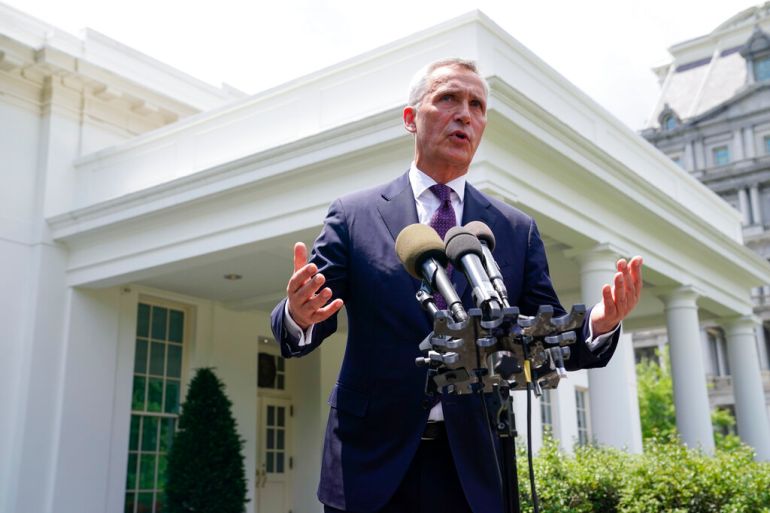NATO chief on Ukraine war: We have to be prepared for ‘long haul’
Jens Stoltenberg says conflict is turning into ‘war of attrition’, and NATO is not seeking escalation with Russia.

NATO Secretary-General Jens Stoltenberg has suggested that the US-led alliance is anticipating long term conflict in Ukraine as the Russian invasion turns into a “war of attrition”.
Speaking to reporters outside the White House after meeting with US President Joe Biden on Thursday, Stoltenberg said it is difficult to predict how or when the conflict will end.
Keep reading
list of 3 itemsUkraine keeps World Cup hopes alive with victory over Scotland
100 days of the Russia-Ukraine war: A battle of beliefs
“Wars are by nature unpredictable,” Stoltenberg said. “And therefore, we just have to be prepared for the long haul because what we see is that this war has now become a war of attrition where the Ukrainians are paying a high price for defending their own country on the battlefield, but also where we see that Russia is taking high casualties.”
He added that NATO’s “responsibility” is to provide support for the Ukrainians.
Stoltenberg reiterated that the war, like most conflicts, will end at the negotiating table.
Russia launched its all-out invasion of Ukraine on February 24 after a months-long standoff that saw Moscow amass troops near the Ukrainian borders as Russian President Vladimir Putin demanded an end to NATO expansion into former Soviet republics.
After it failed to capture the capital, Kyiv, Moscow has scaled back its war objectives, shifting its war efforts to the eastern Donbas region and the southern parts of Ukraine.
The US and its allies have been supplying Ukraine with weapons and training Ukrainian troops on them at locations outside the country. On Wednesday, Biden announced a new $700m weapons package to Ukraine that includes advanced rocket systems and anti-aircraft missiles.
But the arms could take weeks to arrive in Ukraine, The Associated Press reported, as Russia makes advances in the east of the country.
Meanwhile, the Kremlin has continued to warn that sending Western weapons to Ukraine will prolong the war.
“This pumping of Ukraine with weapons … will bring more suffering to Ukraine, which is merely a tool in the hands of those countries that supply it with weapons,” Kremlin spokesman Dmitry Peskov said.
On Thursday, Stoltenberg said Russian President Vladimir Putin wanted “less NATO” when he invaded Ukraine, “but he’s getting more NATO” as Finland and Sweden push to join the alliance.
The two Nordic countries’ bids for NATO accession have faced Turkish opposition that could prevent them from joining, as new allies must be approved by all 30 existing members.
Turkey has accused the European countries of providing a safe haven for “terrorists”, referring to the Kurdistan Workers’ Party (PKK). Poland and Sweden had also restricted arms sales to Ankara in 2019 after a Turkish military operation against Kurdish forces in northern Syria.
Stoltenberg said the alliance is working to address Turkey’s concern and “find a united way forward”. He also praised Ankara’s role in NATO, calling it an “important ally”.
As the war in Ukraine reaches the 100-day mark, the NATO chief stressed that the alliance is not looking to escalate the conflict.
He warned that a “full-fledged war” between NATO and Russia would result in even more deaths and destruction.
“We provide support to Ukraine, but we’re not part of the conflict,” he said.
Stoltenberg said NATO allies had deployed troops and reinforcements to eastern flank countries near Russia to send a message for Moscow against miscalculations about the alliance’s willingness to defend its members.
“This is deterrence. That’s not to provoke a conflict, but it’s to prevent the conflict,” he told reporters.